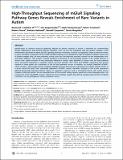| dc.contributor.author | Kelleher, Raymond J. | |
| dc.contributor.author | Geigenmüller, Ute | |
| dc.contributor.author | Hovhannisyan, Hayk | |
| dc.contributor.author | Trautman, Edwin | |
| dc.contributor.author | Pinard, Robert | |
| dc.contributor.author | Rathmell, Barbara | |
| dc.contributor.author | Carpenter, Randall | |
| dc.contributor.author | Margulies, David Michael | |
| dc.date.accessioned | 2013-03-04T19:13:15Z | |
| dc.date.issued | 2012 | |
| dc.identifier.citation | Kelleher, Raymond J., III, Ute Geigenmüller, Hayk Hovhannisyan, Edwin Trautman, Robert Pinard, Barbara Rathmell, Randall Carpenter, and David Margulies. 2012. High-throughput sequencing of mGluR signaling pathway genes reveals enrichment of rare variants in autism. PLoS ONE 7(4):e35003. | en_US |
| dc.identifier.issn | 1932-6203 | en_US |
| dc.identifier.uri | http://nrs.harvard.edu/urn-3:HUL.InstRepos:10362025 | |
| dc.description.abstract | Identification of common molecular pathways affected by genetic variation in autism is important for understanding disease pathogenesis and devising effective therapies. Here, we test the hypothesis that rare genetic variation in the metabotropic glutamate-receptor (mGluR) signaling pathway contributes to autism susceptibility. Single-nucleotide variants in genes encoding components of the mGluR signaling pathway were identified by high-throughput multiplex sequencing of pooled samples from 290 non-syndromic autism cases and 300 ethnically matched controls on two independent next-generation platforms. This analysis revealed significant enrichment of rare functional variants in the mGluR pathway in autism cases. Higher burdens of rare, potentially deleterious variants were identified in autism cases for three pathway genes previously implicated in syndromic autism spectrum disorder, TSC1, TSC2, and SHANK3, suggesting that genetic variation in these genes also contributes to risk for non-syndromic autism. In addition, our analysis identified HOMER1, which encodes a postsynaptic density-localized scaffolding protein that interacts with Shank3 to regulate mGluR activity, as a novel autism-risk gene. Rare, potentially deleterious HOMER1 variants identified uniquely in the autism population affected functionally important protein regions or regulatory sequences and co-segregated closely with autism among children of affected families. We also identified rare ASD-associated coding variants predicted to have damaging effects on components of the Ras/MAPK cascade. Collectively, these findings suggest that altered signaling downstream of mGluRs contributes to the pathogenesis of non-syndromic autism. | en_US |
| dc.language.iso | en_US | en_US |
| dc.publisher | Public Library of Science | en_US |
| dc.relation.isversionof | doi:10.1371/journal.pone.0035003 | en_US |
| dc.relation.hasversion | http://www.ncbi.nlm.nih.gov/pmc/articles/PMC3338748/pdf/ | en_US |
| dash.license | LAA | |
| dc.subject | Biology | en_US |
| dc.subject | Biochemistry | en_US |
| dc.subject | Neurochemistry | en_US |
| dc.subject | Neurochemicals | en_US |
| dc.subject | Glutamate | en_US |
| dc.subject | Synaptic Plasticity | en_US |
| dc.subject | Computational Biology | en_US |
| dc.subject | Population Genetics | en_US |
| dc.subject | Genetics | en_US |
| dc.subject | Genetics of Disease | en_US |
| dc.subject | Neuroscience | en_US |
| dc.subject | Molecular Neuroscience | en_US |
| dc.subject | Signaling Pathways | en_US |
| dc.subject | Neuromodulation | en_US |
| dc.subject | Neurobiology of Disease and Regeneration | en_US |
| dc.title | High-Throughput Sequencing of mGluR Signaling Pathway Genes Reveals Enrichment of Rare Variants in Autism | en_US |
| dc.type | Journal Article | en_US |
| dc.description.version | Version of Record | en_US |
| dc.relation.journal | PLoS ONE | en_US |
| dash.depositing.author | Kelleher, Raymond J. | |
| dc.date.available | 2013-03-04T19:13:15Z | |
| dc.identifier.doi | 10.1371/journal.pone.0035003 | * |
| dash.contributor.affiliated | Hovhannisyan, Hayk | |
| dash.contributor.affiliated | Kelleher, Raymond | |
| dash.contributor.affiliated | Margulies, David | |


